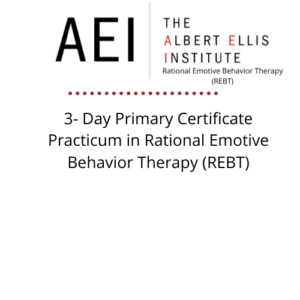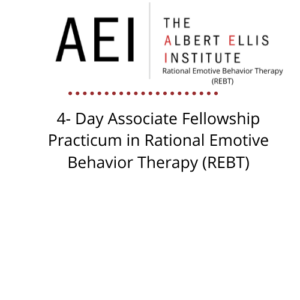Description
$650.00 – $950.00
Description
$650 – Didactics Only (Completion of the didactic portion does not result in a Primary Practicum Certificate.) Participants have 6 months to complete this portion.
$950 – Didactics and Peer Counseling (Upon successful completion of both portions, you will receive a Primary Practicum Certificate.) Participants have a total of 12 months to complete the certificate program.
The focus of this course will be on strategies to identify and restructure clients’ dysfunctional beliefs and constructing more adaptive beliefs, emotions, and behaviors. REBT’s conceptualization of emotions and common errors new REBT Therapists make will also be addressed.
Learning Objectives for the Didactic Portion Only:
Participants will learn to:
- Explain the REBT theory of emotional and behavioral disturbance and change.
- Describe REBT’s conceptualization of emotions from a binary distress perspective.
- Explain the process of motivational syllogism used for undermotivated clients.
- Explain the four irrational beliefs as they relate to emotional and behavioral disturbance.
- Demonstrate to clients the connection between beliefs and emotions/behaviors.
- Identify and restructure clients’ irrational beliefs.
- Demonstrate how to develop new adaptive beliefs, emotions, and behaviors.
- Describe at least ten (10) common errors new REBT therapists make.
- Describe intervention strategies to address errors made by new REBT therapists.
- Compile a list of cognitive, emotive, and behavioral homework assignments to be negotiated with clients.
- Identify obstacles to homework completion.
- Describe strategies to overcome identified obstacles.
Learning Objectives for the Peer Counseling Portion Only:
Participants will learn to:
- Demonstrate the ability to identify an activating event, emotional and behavioral consequences, and irrational beliefs.
- Apply cognitive restructuring strategies to change irrational beliefs.
- Create healthier rational beliefs to change dysfunctional emotions and maladaptive behaviors to functional emotions and self-preserving behaviors.
Available dates and times for Peer Counseling:
Check back soon for available dates.
**Peer Counseling sessions are scheduled on a first come, first served basis. Please email info@albertellis.org to request Peer Counseling dates after successful completion of the didactics component. To conduct a Peer Counseling session, we must have two participants registered for the same date and time slot.
Faculty:
Kristene A. Doyle, Ph.D., Sc.D., is the Executive Director of Albert Ellis Institute (AEI). Dr. Doyle is also Director of Clinical Services, founding Director of the Eating Disorders Treatment and Research Center (EDTRC), and a licensed psychologist at AEI. During her 23-year tenure at AEI, Dr. Doyle has held various leadership roles including Associate Executive Director, Training and Development Coordinator, and Director of Child and Family Services. She is also a Diplomate in Rational-Emotive & Cognitive-Behavior Therapy (RE & CBT) and serves on the Diplomate Board.
Raymond DiGiuseppe, Ph.D., Sc.D., is Director of Professional Education and licensed Staff Psychologist at Albert Ellis Institute (AEI). After earning a B.S. degree from Villanova University, Dr. DiGiuseppe received his Ph.D. from Hofstra University in 1975. He completed a postdoctoral fellowship at AEI in 1977. In 1980 he became the Institute’s Director of Professional Education, a position he has held since then.
Steve A. Johnson, Ph.D., Sc.D., is a Fellow, Approved Supervisor and Diplomate in REBT through Albert Ellis Institute (AEI) in NYC. He was mentored by Dr. Albert Ellis himself and currently serves as the President of the Board of Directors of AEI. He is also a professor in clinical counseling and the director of the graduate program in addictions counseling. His specialties include treating PTSD, substance use disorders, and behavioral/process addictions.
Program: Primary Certificate in Rational Emotive Behavior Therapy
Number of Didactic hours: 16
Number of Peer Counseling hours: 2
- 16 Contact Hours/ 16 Continuing Education Credits will be provided by Albert Ellis Institute for completion of the Didactic portion only.
- 18 Contact Hours/ 18 Continuing Education Credits will be provided by Albert Ellis Institute for completion of the Didactic and Peer Counseling portion.
Module 1: The Theory of REBT
This module is an introduction to Albert Ellis’ theory of emotional disturbance, including its origins and the ABC framework (Activating event-Beliefs-emotional and behavioral Consequences). Core irrational beliefs (demandingness, frustration intolerance, awfulizing, global rating of self and others) and the consequential unhealthy negative emotions (anxiety, anger, depression, guilt, shame, hurt) and maladaptive behaviors (procrastination, abuse of substances, verbally and physically lashing out at others, etc.) will be addressed.
Module 2: Clinical Interventions and Strategies
This module will cover the clinical implications of Ellis’ distinction between disturbed and non-disturbed emotions; how one goes about assessing irrational beliefs; the distinction between practical versus emotional problems and solutions; why REBT proposes addressing emotional problems before practical problems; and the prerequisite insights necessary before disputing client irrational beliefs. There will be a focus on the B (Belief) and C (emotional and behavioral consequences) connection. This ultimately asks clients to assume responsibility for their thoughts, feelings, and behaviors; thereby, giving them control to change them.
Module 3: Dealing with Emotions in REBT
This module discusses the binary model of distress as it relates to emotions. A review of the inference themes of the dysfunctional negative emotions (depression, anxiety, anger, shame, guilt, hurt) and the functional negative emotions (sadness, concern, annoyance, disappointment, regret), as well as the respective behavioral/action tendencies, will be addressed.
Module 4: Mistakes to Avoid in REBT
Beginning therapists practicing REBT make a variety of errors, including not being active and directive, not setting an agenda, not recognizing when the target emotion has changed during a session, and allowing clients to spend too much time talking about their past, etc. This lecture reviews the common errors therapists make as well as strategies to correct them.
Required Reading:
A Practitioner’s Guide to Rational-Emotive Behavior Therapy 3rd Edition by R. DiGiuseppe, K. A. Doyle, W. Dryden, & W. Backx
Dealing with Emotional Problems Using Rational Emotive Behaviour Therapy (REBT): A Practitioner’s Guide -2nd Edition by W. Dryden
* Some instructors may receive royalties for the publication of any texts, books, articles, chapters, or psychological tests that are required, discussed and/or referred to in the presentations.
Evaluation of Knowledge:
- Successful completion of all quizzes (75%) as well as a final exam (75%) provided by AEI on the theory and practice of Rational Emotive Behavior Therapy.
Online Peer Counseling (optional):
If you are interested in receiving a Primary Certificate in Rational Emotive Behavior Therapy, participants will be required to conduct four 20-minute sessions of peer counseling, where they will serve as the therapist to demonstrate the skills learned in the didactic portion of the training. During peer counseling, an REBT Core Faculty Trainer will observe each participant working with a volunteer, who will discuss a real problem. Participants will receive in vivo feedback of their demonstrated skills with the opportunity to correct their errors and enhance their practice.
Evaluation of Skills:
- Skills rating of a minimum average of “3.5” utilizing the Albert Ellis Institute ITSPRC Evaluation form across the 4 live peer counseling sessions by at least two AEI Core Faculty Trainers. If the participant does not meet this requirement, they can provide additional demonstration(s) of peer counseling skills as necessary, to be reviewed by an approved faculty member at an additional cost to the participant.
Eligibility for Professional Certificate:
Open to psychologists, counselors, social workers, physicians, nurses, and graduate students. The minimum qualification for certificate candidacy is a master’s degree in psychology or counseling, M.S.W., M.D., R.N., or an equivalent degree based on the regulations of the jurisdiction where one practices. Proof of degree or license must accompany the registration form.


Albert Ellis Institute is approved by the American Psychological Association to sponsor continuing education for psychologists. Albert Ellis Institute maintains responsibility for this program and its content.
Albert Ellis Institute has been approved by NBCC as an Approved Continuing Education Provider, ACEP No. 5145. Programs that do not qualify for NBCC credit are clearly identified. Albert Ellis Institute is solely responsible for all aspects of the programs.
Albert Ellis Institute is recognized by the New York State Education Department’s State Board for Psychology as an approved provider of continuing education for licensed psychologists #PSY-0133.
Albert Ellis Institute is recognized by the New York State Education Department’s State Board for Social Work as an approved provider of continuing education for licensed social workers #SW-0131.
Albert Ellis Institute is recognized by the New York State Education Department’s State Board for Mental Health Practitioners as an approved provider of continuing education for licensed mental health counselors #MHC-0019.
Additional information
| Registration Type | Didactics, Didactics and Peer Counseling |
|---|



